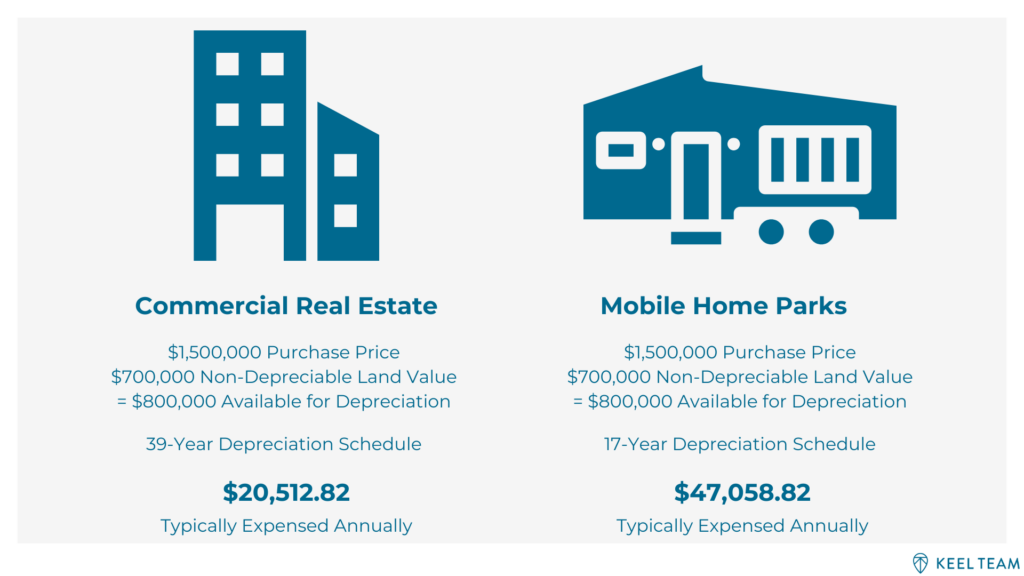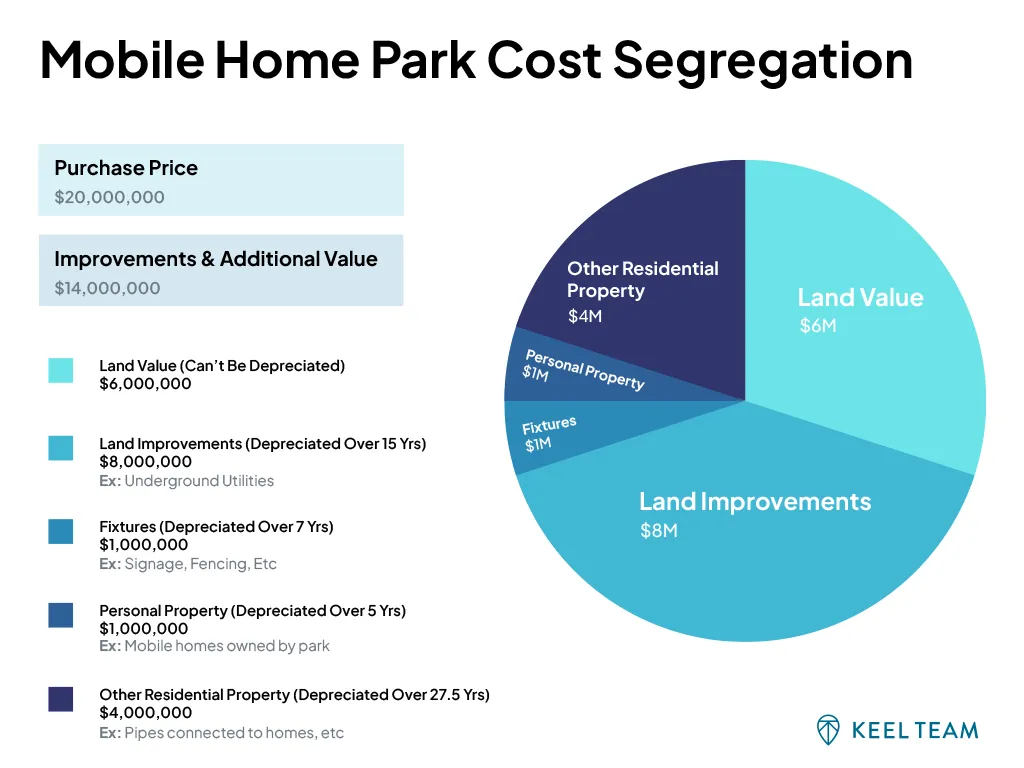Mobile Home Park Investments: Navigating Depreciation
-
 Tristan Hunter - Investor Relations
Tristan Hunter - Investor Relations
Investing in real estate often offers a promising avenue for potential wealth accumulation and financial stability. Among the various real estate investment options, mobile home park investments have gathered attention due to their potential for generating steady income streams and the possibility of long-term appreciation. A key area that warrants exploration within mobile home park investments is depreciation. This could play a significant role in effectively managing taxes and maximizing potential returns.
In this article, we’ll jump into the foundational aspects of depreciation, the potential benefits it may offer, and the concept of depreciation recapture within the mobile home park asset class.
Let’s dive in!
General Dynamics of Depreciation in Mobile Home Park Investments
Depreciation, within the context of real estate, generally surfaces as a tax-related consideration that acknowledges wear and tear, gradual deterioration, or the obsolescence of an asset over its useful life. For investors in mobile home parks, the physical structures and improvements constituting the property typically undergo a gradual process of depreciation. These are largely due to factors such as weather, usage frequency, and the natural course of aging. This often allows investors to allocate depreciation as a portion of the property’s cost as a potential expense over its useful life.
From a prospective tax standpoint, the notion of depreciation potentially holds several benefits for mobile home park investors:
Tax Deductions: Depreciation offers a potential avenue for reducing taxable income. This may result in a likely reduction in the overall tax burden. This is an outcome that often enables investors to free up financial resources that may potentially be directed toward other investment avenues.
Potentially Enhanced Cash Flow: The likelihood of employing depreciation as a financial tool may lead to potential growth in cash flow. As taxable income may decrease due to depreciation, this often arises in increased cash flow. This could be further utilized for various purposes, ranging from property maintenance to potential reinvestment.
Likely Preservation of Wealth: While making use of depreciation deductions, investors typically set aside resources for the future replacement or renovation of assets undergoing depreciation. This potential course of action may contribute to the preservation of the property’s value over the long term.
Potential Maximization of ROI: The likelihood of reduced tax liability and increased cash-flow may have the potential to create a more favorable return on investment landscape for the investors, potentially enhancing the overall profitability of their mobile home park investment.
Depreciation: Commercial Real Estate vs Mobile Home Parks

Depreciation Recapture in Mobile Home Park Investments
In the trajectory of owning an investment property with depreciating assets, it becomes crucial to grasp the potential nuances of depreciation recapture. This is a concept that could possibly hold implications for tax management and overall investment strategy. The IRS, recognizing the likely advantage investors derive from depreciation deductions, has provisions in place to recapture a certain degree of the tax benefits at the point of property sale. This is where the concept of depreciation recapture comes into the picture.
Potential Strategies for Depreciation Recapture in Mobile Home Investments
Although the notion of depreciation recapture may be often perceived as presenting challenges, it is important to note that mobile home parks typically follow an accelerated depreciation schedule of around 17 years. This has the potential to significantly reduce your tax burden if applied correctly. There are also possible strategic approaches that investors in mobile home parks could employ to potentially manage the impact on their investment returns:
Potentially Offset Passive Income with Passive Losses: Passive investors often offset their passive income and gains with their passive losses. For active investors, it follows a similar principle of typically offsetting active business income with active business losses. If you have Real Estate Professional status, you will likely be able to turn your rental losses non-passive, which could possibly reduce your overall taxable income.
1031 Exchange: A commonly considered strategy is to engage in a 1031 exchange—an approach often regarded as a like-kind exchange. By reinvesting the proceeds from the property sale into another qualifying property, investors may potentially defer taxes on the amount subject to recaptured depreciation. This likely avenue for tax deferral may offer the opportunity for continued investment growth.
Property Enhancement: While complete avoidance of depreciation recapture may not be guaranteed, investing in property enhancements and renovations can potentially act as a mitigating factor. The likely outcome of this strategy could be the adjustment of the property’s basis, potentially reducing the amount subject to recapture.
Bonus Depreciation: A tax incentive that typically allows businesses to accelerate the depreciation of certain assets, mobile home parks included. This means that they can potentially receive larger tax deductions in the earlier years of an asset’s useful life. This encourages investment and economic growth by providing companies with a financial advantage. However, as of this year, changes are underway in the Bonus Depreciation landscape, with it expected to be phased out entirely by 2027.
Cost Segregation Study: A cost segregation study is a tool often used by real estate investors, including those in mobile home park ventures; examines property components for potentially accelerated depreciation periods. This will likely reduce immediate taxes and enhance cash flow. In mobile home park investments, it has the potential to allocate more value to shorter-lived assets like infrastructure and amenities. This potential increase in depreciation deductions could potentially assist in offsetting taxable income. Cost segregation typically identifies qualified real property that can be depreciated in as little as five, seven and 15 years. Collaboration with tax professionals is crucial for staying compliant and potentially maximizing the benefits of the study.

In Conclusion: Exploring the Potentials
Depreciation in mobile home park investments is a potentially useful tool that often brings various financial benefits. However, it’s important to consider ‘depreciation recapture,’ which can change the tax situation when the property is sold. Armed with insights into the essentials of depreciation and depreciation recapture, mobile home park investors will likely find themselves better equipped to make informed decisions, implement strategies tailored to their unique contexts, and navigate the possibilities of mobile home park investing while optimizing their potential returns.
As with any investment decision and matters pertaining to tax, it is crucial to do your own due diligence, and seek the guidance of professionals specializing in tax matters and financial advisory, to increase the likelihood of decisions being aligned with individual investment goals and circumstances. This will likely help you make informed investment decisions.
Stay tuned for more passive mobile home park investing guidelines from this blog– which I hope will help you gain insight into mobile home park investing.
Let’s Talk
Get in touch with us to learn more about mobile home park investing today!
Curious to explore more insights in passive mobile home park investing? Contact us to potentially learn more about depreciation and how using it correctly will likely benefit you on your mobile home park investing journey.
Disclaimer:
The information provided is for informational purposes only and should not be considered investment advice, nor a guarantee of any kind. There are no guarantees of profitability, and all investment decisions should be made based on individual research and consultation with registered financial and legal professionals. We are not registered financial or legal professionals and do not provide personalized investment recommendations.

Tristan Hunter - Investor Relations
View The Previous or Next Post
Subscribe Below 👇





